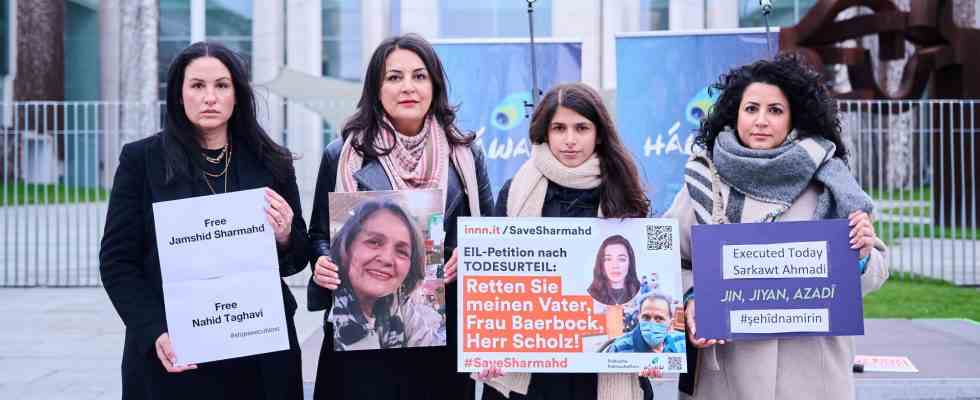Status: 03/30/2023 1:55 p.m
After the death sentence against the German-Iranian Jamshid Sharmahd, his daughter is demanding public pressure from the German government. In doing so, it opposes the strategy of “silent diplomacy”.
The kidnapping of her father to Iran two and a half years ago turned Gazelle Sharmahd into an activist. “My father needs publicity to survive. That’s why I became his voice,” she said shortly after landing in Germany.
A month ago, Jamshid Sharmahd was sentenced to death in a show trial in Iran. The Sharmahds are German citizens. You lived in Hanover for a long time before moving to the USA. “That’s why I came to Berlin, to put pressure on and to talk to the decision-makers personally,” says the 41-year-old.
Her father is a political hostage of the Iranian regime. Every day Gazelle Sharmahd fears execution. She had three days to convince the federal government to publicly support her father.
“Silent diplomacy” instead of publicity
The federal government did not comment publicly on the case until his conviction. The Federal Foreign Office states that it has worked for Sharmahd from the start and “at all levels” – just behind the scenes.
It’s called “silent diplomacy.” The government chooses this strategy “when its negotiating position is weak,” explains Middle East expert Guido Steinberg from the German Science and Politics Foundation. “The federal government wanted to hide the fact that it could possibly be blackmailed.”
The Iranian regime officially blames Sharmahd for a terrorist attack on a mosque that killed several people. The allegations cannot be independently verified. Amnesty International speaks of a show trial. Sharmahd is a well-known opponent of the regime. In the US, he was active in the exile opposition group Tondar, which wants to overthrow the Islamic Republic.
“Jamshid Sharmahd is seriously ill, he is not receiving any medication or legal assistance,” says human rights activist Düzen Tekkal, who invited Gazelle Sharmahd to Germany. “The regime wants to make an example of him. He’s being used as a bargaining chip.”
“strategy failed”
His death penalty was announced shortly after the fifth EU sanctions package was passed. Because of “corruption on earth” – a verdict that is often pronounced against critics of the regime. The federal government then made its first public statement: Foreign Minister Annalena Baerbock criticized the lack of rule of law in the process and expelled two Iranian diplomats.
But Gazelle Sharmahd is not enough. She wants the federal government to speak out publicly in favor of her father’s release. “The federal government must accept that its strategy has failed,” she says.
Iran expert Ali Fathollah-Nejad agrees: “This reluctance is seen in Tehran as a sign of weakness and encourages the Islamic Republic to continue this practice.”
Merz took over “sponsorship”
That’s why Gazelle Sharmad continues to tour Berlin. One appointment follows the next. She meets federal politicians, talks to political foundations and gives TV interviews. The meeting with Friedrich Merz shows her what pressure from politics can do. The CDU leader is “political godfather” for Jamshid Sharmad. In this way, several members of the Bundestag stand up for political prisoners in Iran.
“When Mr. Merz took over the sponsorship, everything changed,” she says. There is more press, contacts, attention – and the regime’s strategy has also changed. “As soon as Mr. Merz said that he would take a close look at this process, they continued it behind closed doors,” she says.
CDU leader Friedrich Merz is Jamshid Sharmahd’s “political godfather”.
Image: dpa
The Chancellery also invited Gazelle Sharmahd to an interview. The fact that the meeting is taking place behind closed doors seems to be another indication that the federal government is sticking to its strategy of “quiet diplomacy”.
After the appointment, Gazelle Sharmahd is relieved that the Chancellery took the time for her. But she’s sticking to her fight for attention: “I’ve been told for two years that my father is being campaigned for at a high level. And what’s the result? The death sentence.”
Middle East expert warns of public pressure
Middle East expert Steinberg, who worked in the chancellery himself until 2005, says: “Public pressure can drive up the price in such negotiations.” When Tehran notices that the federal government is under great public pressure, that strengthens Iran’s negotiating position.
Gazelle Sharmahd and her supporters see things differently. More than 320,000 people have signed a petition in which she and her supporters call on Foreign Minister Baerbock to do more for her father.
On the last day of her journey, Gazelle Sharmahd is exhausted but also content. “I can’t blame myself for not trying everything and speaking to everyone,” she says.
No one can tell her now that he doesn’t know anything about her father’s fate. “Now it is important that words are followed by deeds,” she says and gets into the car. Continue to the next appointment.

